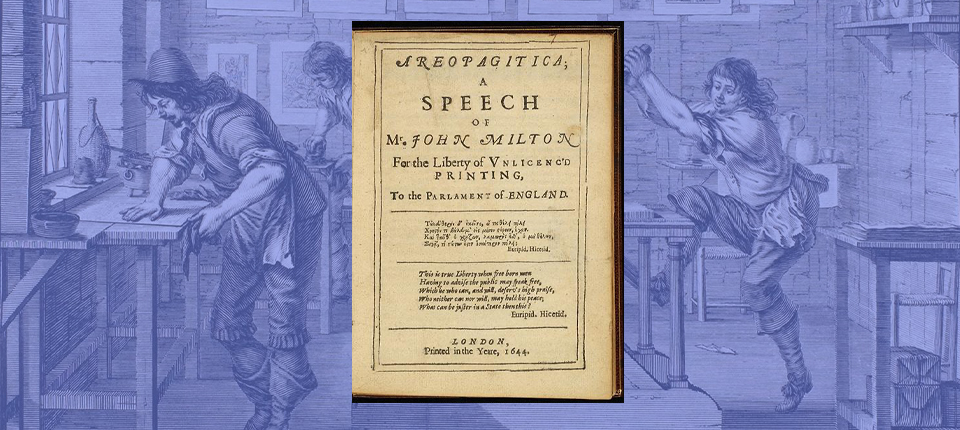The Best of the Literary Internet, Every Day
TODAY: In 1644, John Milton publishes Areopagitica, a pamphlet decrying censorship.
- “When Lee left, she had only what she could take with her. She was young, naïve.” Kim Young on what she can learn from Lee McCarthy in an era of divorce novels. | Lit Hub Biography
- “I wanted to be entirely where I was, to notice actively rather than reflectively, to use my body to write and not just write about my body.” Traci Brimhall on how her poetry has transformed as chronic illness shifts the pacing of her life. | Lit Hub Craft
- Christiana Spens on searching for her father (and the Moomins) in Helsinki. | Lit Hub Memoir
- Edwin Frank considers what the novels of William Faulkner and Ralph Ellison reveal about America and its literary reckoning. | Lit Hub Criticism
- Ross Perlin on why AI will fail to save endangered languages. | The Dial
- “First, I want to make a really big point of the fact that we have the technology, the science, and the money to save ourselves. It’s not a technology problem; it’s a political problem.” Tom Athanasiou on climate realism and climate justice. | The Nation
- “These were never intended for anyone beyond the recipients’ eyes. But there we stood, looking for the sender.” Norah Rami on tracing her history at an archival epistolary exhibition in India. | Dirt
- “Joan was thus twice disappointed: in love and literature. New York must’ve felt like a failure to her—to have come so close and then not to have made it.” Lili Anolik documents Joan Didion’s first love—Noel Parmentel Jr. | Vanity Fair
- “In its highest aspirations, the studiolo, as developed by humanists from Petrarch to Machiavelli to Montaigne, is a sanctuary for self-cultivation.” Andrew Hui on the emergence of the private study. | Public Domain Review
- On attempts to communicate with animals (and why corporate tech will not save us): “All that now separates us from enlightenment is a few more rounds of funding.” | The Baffler
- Tasha Sandoval on a literary canon that honors elders: “Through intergenerational dialogue and deft, emotive narration, the new abuelita canon gives a sense of interiority and agency to our abuelita’s lives.” | Public Books
- Brahim El Guabli explores indigenous Amazigh literary tradition. | Words Without Borders
- “I do believe that all great works of literature have an ethical core.” Merve Emre talks to Devika Rege about craft, democracy, and nationalism. | Public Books
- Robin Wall Kimmerer and Jenny Odell discuss ecology, economics, and the currency of a gift economy. | Orion
- Kristen Ghodsee looks to Eastern Europeans’ experiences of “internal immigration” amid authoritarianism for lessons on escapism. | The New Republic
- “Every artist has to go through this process of selection and omission every moment…” Sumana Roy examines “etceterization” in literature. | Los Angeles Review of Books
- “Battles over books in school libraries have become emblematic of the country’s larger culture wars over race, historical revisionism and gender identity.” Jeffrey Fleishman considers the future of American book bans. | Los Angeles Times
- What does Trump 2.0 mean for the publishing industry? Emily Gould investigates. | The Cut
- Merve Emre revisits Thomas Mann’s The Magic Mountain. | The Yale Review
Also on Lit Hub:
The epistolary friendship between Oliver Sacks and Thom Gunn • A visual history of Black America • Our use (and misuse) of urban space • Bryan VanDyke on how spontaneity and chaos helped him write • How a teenage Princess Victoria became queen • How Sylvia Plath found her literary voice by keeping a diary • Stephen Sondheim and the intersection of visual art and musical theater • On James Baldwin’s relationship with his stepfather • Jessie Van Eerden considers notions of home and self • The long history of Moon lore • The power and beauty of an illuminating oceanic phenomenon • Maris Kreizman revisits 50 Shades of Grey in the age of the mega-rich creeper • Rita Omokha on the 2024 election and what we can learn from history • Abigail Thomas gifts words of wisdom to younger writers • Dive into Sergio de la Pava’s TBR list • 5 book reviews you need to read this week • Michael Maslin explores what it means to be a New Yorker cartoonist • Andrea Gilats on ageism, care, and Alzheimer’s • Read poet and organizer Jody Chan’s Giller Prize boycott speech • Maya Kessler praises the art of dialogue • Brian Castleberry talks to Mark Haber about distraction • The best reviewed books of the week • Why we (really) need Alexander Pope • How the ancient Sumerians developed the world’s oldest system of writing • This week on The Lit Hub Podcast: Gatsby, AI, and assholes

